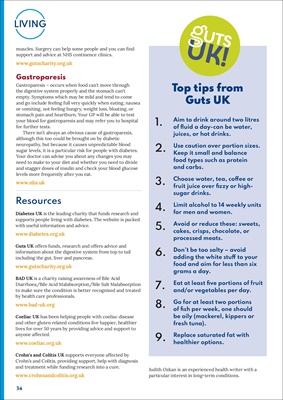
34
LIVING
Top tips from
Guts UK
Judith Ozkan is an experienced health writer with a
particular interest in long-term conditions.
Resources
Diabetes UK is the leading charity that funds research and
supports people living with diabetes. The website is packed
with useful information and advice.
www.diabetes.org.uk
Guts UK offers funds research and offers advice and
information about the digestive system from top to tail
including the gut, liver and pancreas.
www.gutscharity.org.uk
BAD UK is a charity raising awareness of Bile Acid
Diarrhoea/Bile Acid Malabsorption/ Bile Salt
Malabsorption to make sure the condition is better
recognised and treated by health care professionals.
www.bad-uk.org
Coeliac UK has been helping people with coeliac disease
and other gluten related conditions live happier, healthier
lives for over 50 years by providing advice and support to
anyone affected.
www.coeliac.org.uk
Crohn's and Colitis UK supports everyone affected
by Crohn's and Colitis by proving support, working to
diagnosis and treatment and funding research into a cure.
www.crohnsandcolitis.org.uk
muscles. Surgery can help some people and you can find
support and advice at NHS continence clinics.
www.gutscharity.org.uk
Gastroparesis
Gastroparesis - occurs when food can't move through
the digestive system properly and the stomach can't
empty. Symptoms which may be mild and tend to come and
go include feeling fully very quickly when eating, nausea
or vomiting, not feeling hungry, weight loss, bloating, or
stomach pain and heartburn. Your GP will be able to test
your blood for gastroparesis and may refer you to hospital
for further tests.
There isn't always an obvious cause of gastroparesis,
although this too could be brought on by diabetic
neuropathy, but because it causes unpredictable blood
sugar levels, it is a particular risk for people with diabetes.
Your doctor can advise you about any changes you may
need to make to your diet and whether you need to divide
and stagger doses of insulin and check your blood glucose
levels more frequently after you eat.
www.nhs.uk
1.
Aim to drink around two litres
of fluid a day-can be water,
juices, or hot drinks.
2. Use caution over portion sizes.
Keep it small and balance
food types such as protein
and carbs.
3. Choose water, tea, coffee or
fruit juice over fizzy or highsugar
drinks.
4. Limit alcohol to 14 weekly units
for men and women.
5. Avoid or reduce these: sweets,
cakes, crisps, chocolate, or
processed meats.
6. Don't be too salty - avoid
adding the white stuff to your
food and aim for less than six
grams a day.
7. Eat at least five portions of fruit
and/or vegetables per day.
8. Go for at least two portions
of fish per week, one should
be oily (mackerel, kippers or
fresh tuna).
9. Replace saturated fat with
healthier options.